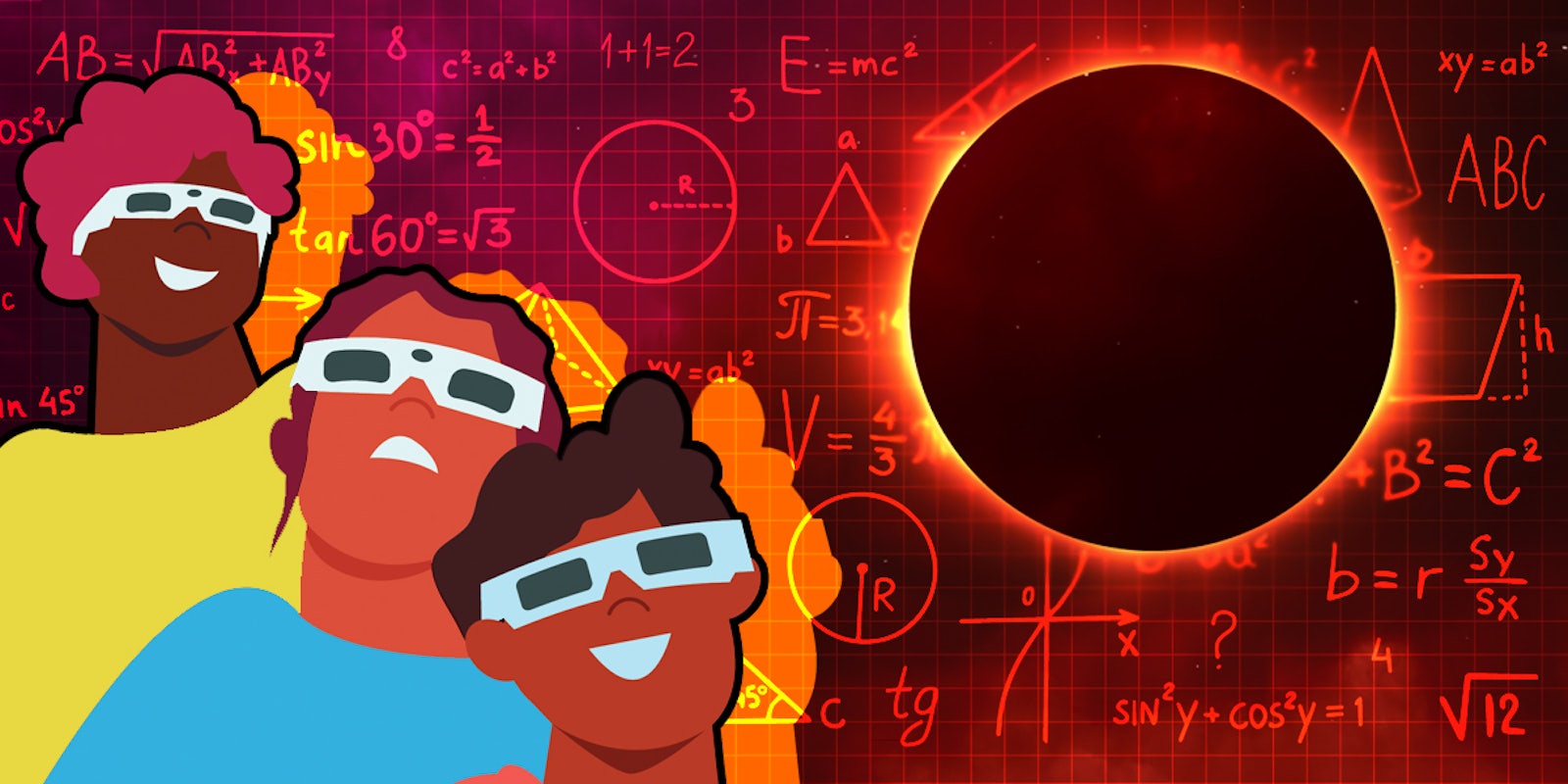
On Monday afternoon, I took a brief break from work to go to the New York Hall of Science. I donned some last-minute eclipse drip (the hall’s event was the only one near me still giving out glasses). I sat next to some screaming toddlers. And I watched a tiny sliver of light come in and out of view underneath the clouds. “Gangnam Style” and “Macarena” played in the background.
With families sitting on picnic blankets and kids dancing and laughing along, everyone was looking up. The moment was brief, maybe a few seconds before boredom kicked in and people started scrolling on their phones. I was surprised to see just how many kids were also on their phones. (I, too, took a scroll before my partner reminded me that this wouldn’t be happening for another 20 years. So I’d better take a longer look while I could.)
The truth is, for many of us, the exciting part of this event wasn’t the moon blocking the sun. It was the digital aftermath of the cultural zeitgeist. That afternoon, pretty much everything I saw online was about the eclipse. And from what I could see, you can divide most online eclipse reactions into two categories: camaraderie and conspiracies.
On one hand, you had people online rejoicing and commiserating in our shared experiences. This typically took place via slice-of-life content (vlogs, selfies with glasses, et cetera) and memes. Memes were the star of this show. Classic meme formats took a new shape in complaints about people burning their retinas or clouds blocking views. Others used the moment to make memes about other tangential universal human experiences, like exes sliding in your DMs. And tipping culture.
On the other hand, conspiracy theorists on X and Truth Social connected the eclipse to the Biden Administration. Biblical influencers warned followers of the Rapture, and alt-right podcaster Alex Jones connected the event to the Bible, the Department of Homeland Security, and the ancient Egyptian Gods. And then, of course, fringe astrology TikTokers blamed the eclipse for things like demon face syndrome.
It seems like all online reactions to natural phenomena like the eclipse fall somewhere in the buckets of light-hearted meme-ry and End Times conspiracy. The earthquake in New York last week got similar online reactions, ranging from “we will rebuild” memes to paranoid numerologists linking the magnitude of the earthquake to the date of the eclipse.
I’m not the only one who had this takeaway about the dichotomy of man on the internet. Writer Alaina Demopoulos of the Guardian remarked, “From eclipse donuts to deep-state lunacy, the weeks-long social media buildup to a solar eclipse is birthing memes, marketing gimmicks, and more than a few conspiracy theories.”
Journalist Ryan Broderick of the Garbage Day newsletter had an insightful take yesterday on why our feeds descend into fragments of memes and conspiracy in times like this. “Everything that happens beyond our screens now is uploaded and flattened into abstracted entertainment, discourse, an AI-generated summary, a trend for brands to advertise around,” Broderick wrote.
Meanwhile, humanity’s trust in legacy news is dwindling, and so is our trust in science. As author Mike Rothschild told Rolling Stone, it’s not out of the ordinary that there are “weird theories and superstitions around cosmic events like eclipses, because people don’t understand science and how anything works.”
Creators, too, aid and abet this. Life’s biggest problems distill into quick-fired, non-fact-checked 280-character tweets and 30-second videos. And for better or for worse, life’s biggest scientific wonders whittle into digestible jokes, memes, and Bill Nye thirst traps.
This categorization of content was expected, as everything on the internet these days has to fit into a particular worldview — either this way or that way. Everything online travels fastest and farthest in its most condensed form, whether it’s exploited to further fuel a conspiracy theory or make strangers on the internet laugh. But hey, at least some of these memes are getting people excited about science.
– Grace Stanley, Deputy Editor
In Today’s Newsletter:
- Can Gambling Content Be Ethical? YouTuber Brian Christopher Is Trying To Find Out
- Lessons Learned From the Hatsune Miku Concert Flop
- Elon Musk Flounders in Recently Released Deposition
- TikTok’s Potential Photo App Now Has a Name, TikTok Notes
- Instagram Makes More From Ads Than YouTube
- How To Promote OnlyFans On Social Media Without Getting Banned
